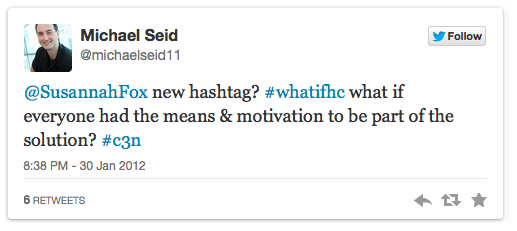#WhatifHC at Medicine X
#Whatifhc is a Twitter hashtag that stands for “What if healthcare…”
It all started with a simple tweet from Michael Seid, Co-PI of the Collaborative Chronic Care Network (C3N ) project.

On February 9th of this year, researcher Susannah Fox published a blog post describing the subsequent discussions that sprung forth from that simple suggestion. She wrote,
“For over a year I’ve been the accidental manager of a community garden. All I did — I swear — is point out an open plot of land and people started pitching in, planting, asking friends to join them. All of a sudden we’d transformed a bare patch into something beautiful.” She went on to write, “They planted ideas about what health care could be like if we remade it, without regard for money, politics, or any other reality.”
On Friday Sept 27, 2013, we’ll assemble a panel of patients, researchers, technologists, and healthcare providers to explore some of the intriguing ideas and concepts that have come from the Twitter community and the Medicine X audience around the #whatifhc hashtag.
What is your healthcare dream? Share it with us on Twitter with the hashtag #whatifhc and #medx or leave a comment below! Follow along on Susannah Fox’s Storify page.
We can’t wait for the discussion at Medicine X in just a few weeks.
-
[…] a recent blog post, Stanford Medicine X executive director Larry Chu, MD, describes how the #whatifhc Twitter […]
[…] this will be one of my themes — data-driven innovation. Another session will focus on other “What if health care…?” questions. I’d love to get the discussion going now on both sessions — please comment […]
Leave a Comment





🙂 Started following it. Love some amazing tweets.
My healthcare reform dream for doctors would be this:
1) Medical school is affordable to all with sincere wishes to be devoted doctors, without incurring any debt.
– Helps avoid financial pressures, which may cause doctors to intentionally or unintentionally engage in conflicts of interest.
– Helps allow doctors to leave the profession if they discover it is not their calling.
– Helps reduce the rising fees associated with healthcare.
2) Physician pay is substantially less, and more uniform among specialties.
– Helps ease social tension among doctors and between the lay public and doctors.
– Helps reduce the expectations of the general public that conventional medicine has all the answers, and that your doctor will fix you after a lifetime of disregarding your own health because of poor life choices.
– Helps reduce the incentive for people to go into medicine solely for profit making and naturally selects for people who feel called to medicine solely out of a sincere desire to care for others.
These measures would substantially improve the quality of the doctor patient relationship by taking away distracting incentives. The trust formed between a doctor and the patient is possibly one of the most important, and often over looked factors in promoting health. Because health is the result of a lifestyle devoted to nourishing one’s self and one’s community. It is the result of extra positive efforts and life changes. Changes that a doctor can inspire in his/her patients, only if they establish a deep level of trust and model the lifestyle themselves.
Sincerely,
Roger Gietzen